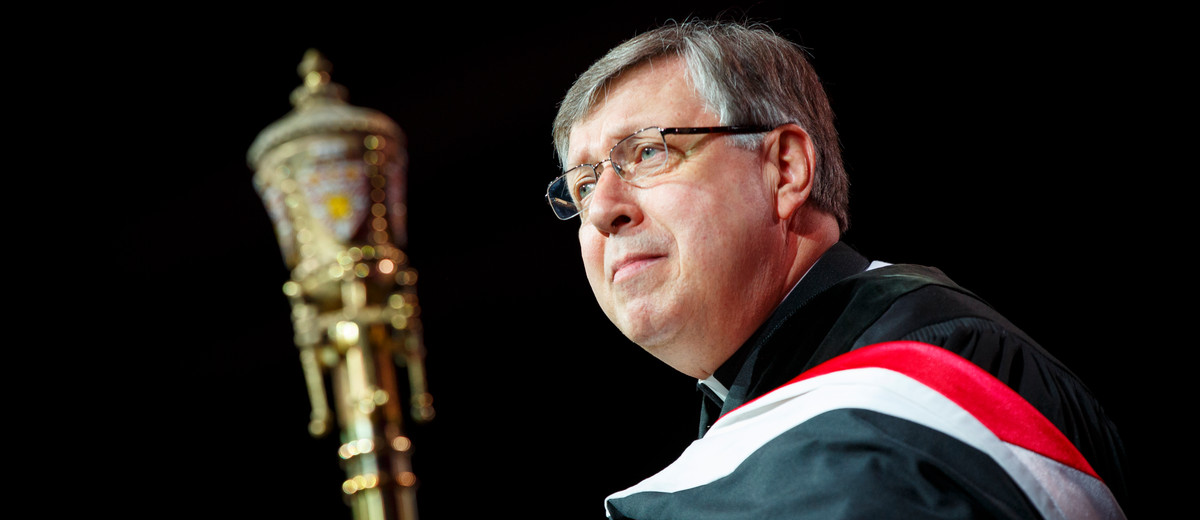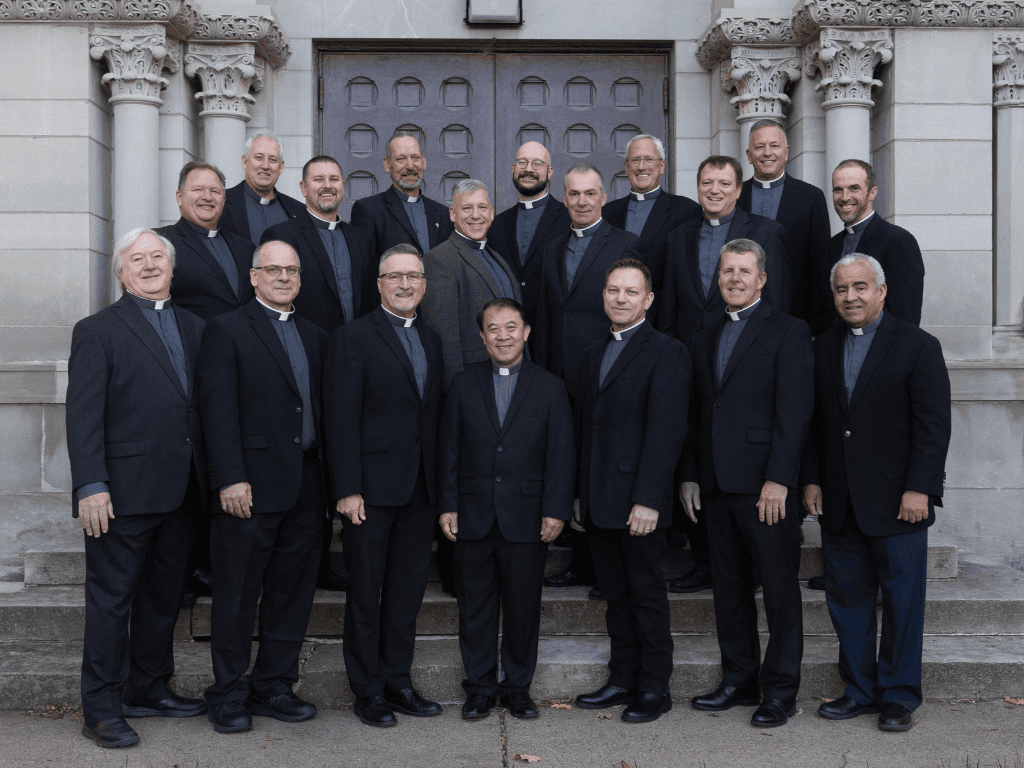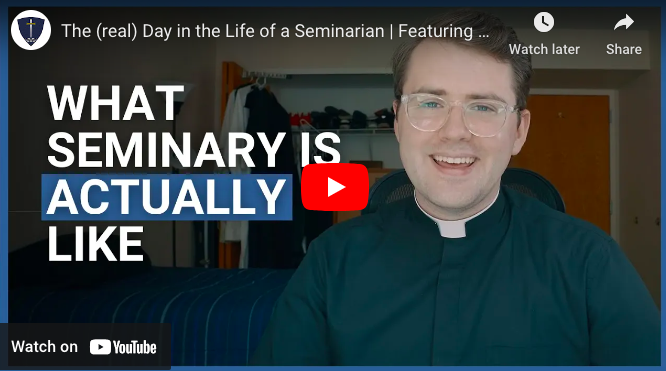Father Larry Snyder is coming home – to Minnesota, to the Archdiocese of St. Paul and Minneapolis and to the University of St. Thomas.
The 1987 alumnus who has led Catholic Charities USA, one of the largest social service agencies in the United States, for nine years will become vice president for mission at St. Thomas on Feb. 1, 2015.
The selection by President Julie Sullivan will bring Snyder, who has led a national movement to end poverty in America, back to his vocational roots, and he could not be happier. As much as he has enjoyed his work at Catholic Charities USA in Washington, D.C., he is eager to return to his adopted home state.
“It’s a huge deal for me,” he said. “I knew at some point that I would come back to Minnesota. Even though I grew up in Illinois, my foundation of support and my friends are in the Twin Cities. I can hardly wait.”
Sullivan feels the same way. She is delighted that Snyder accepted her offer to succeed Father John Malone, who retired May 31 and is returning to the Church of the Assumption in St. Paul to serve as its pastor.
“Father Snyder has been one of the most important and compelling voices over the last decade on more-effective ways of collaboration to end poverty in America and provide greater opportunities for those in need to achieve their full potential,” Sullivan said. “His core beliefs align beautifully with those of the St. Thomas community, and we are excited about the new initiatives he can develop and lead to further fulfill our mission of advancing the common good.”
Snyder sounded the same themes in addressing why his work at Catholic Charities – first in the Twin Cities for 14 years and then in the nation’s capital for nine years – has prepared him well for his new position at St. Thomas.
“As a leader at Catholic Charities, I make sure that Catholic identity drives us,” he said. “I live and breathe the mission. I know I have not done that in a university setting. But if you look at the church’s history in the United States, its ministries – education, health care and social services – were founded at the same time, in the mid to late 1800s, when most Catholics in this country were immigrants having a really tough time.
“In that sense, I think it will be very easy to move to a university that has the same fundamental roots as Catholic Charities. Look at the mission of St. Thomas: it’s about educating students to become morally responsible leaders who will advance the common good. That’s what I believe in. I want to make sure our Catholic identity and our sense of mission reflect who we are and what we do.”
Dr. Mark Neuzil, who served as director of the Office for Mission at St. Thomas under Malone, will be interim vice president for mission until Snyder’s arrival.
Vocation always interested Snyder
Snyder, 63, was born in Lincoln, Ill., the 10th of 12 children. He spent two years at Loras College, and its affiliated Pius X Seminary, in Dubuque, Iowa, and transferred to what is now Benedictine University in Lisle, Ill., where he earned a bachelor’s degree in music and lived in the Benedictine religious community.
He taught music for five years at St. Bede Academy in Peru, Ill., but chose not to take his final vows as a Benedictine. After teaching music and German for three years at Marquette High School in Ottawa, Ill., he moved to the Twin Cities in 1983 to serve as music and adult education director at St. Joseph’s Catholic Church in New Hope.
“When I came to Minnesota, the church was so alive and so many good things were happening that within a year, I knew I wanted to enter the St. Paul Seminary,” he said.
Snyder received a Master of Divinity degree from St. Thomas in 1987 and was ordained an archdiocesan priest the following spring. He later received a master’s degree in public administration from Hamline University.
His first assignments as a priest were as associate pastor at Epiphany in Coon Rapids for two year and at Nativity of Mary in Bloomington for one year. Then one day in 1991 he got a call from Archbishop John Roach, who had been approached by Monsignor J. Jerome Boxleitner, the founding executive director of Catholic Charities.
“‘Box’ was looking for a successor – someone to groom to take over for him when he retired,” Snyder said. “He spoke to the folks at the seminary about who to go after, and they said he should talk to me.
“It’s not something that I had ever considered. I told Archbishop Roach, ‘I think I’m supposed to be a parish priest – that’s what I trained for.’ He asked me to go to Catholic Charities for six months, and if I then wanted to go back to parish work, I could.
“I knew even after a month or two that Catholic Charities was for me. It was amazing and appealing work, and it fulfilled my sense of the church’s mission. It also was one of those situations where the bishop does know better than you what you might do!”
Snyder succeeded Boxleitner when he retired in 1999 and led Catholic Charities here for six years. He was perfectly content in the job, but the national organization asked him in 2005 to become its president. He twice said no, “because I was in the middle of important policy initiatives here,” but agreed to run the issue by Archbishop Harry Flynn.
“I thought he would say no, so I went to see him,” Snyder said. “I told him, ‘The search committee asked me to talk to you about this job, and I totally understand that you need me here.’ He looked at me and said, ‘No, I think you should go.’ Life changed at that point!”
Snyder found immediate challenges after taking the position. Hurricanes Rita and Katrina prompted the agency to expand its disaster response efforts beyond just giving aid, and today it coordinates relief efforts and is active in the field providing hands-on assistance.
Under Snyder, Catholic Charities has become a national thought leader and policy advocate on poverty issues, particularly in the aftermath of the 2008 recession, by encouraging government, business, academia and social services agencies to collaborate more effectively.
He credits Boxleitner for his influence more than two decades ago. “Box was always guided by the fundamental desire to care for the poor,” Snyder said, “and that has marked the work of Catholic Charities in the Twin Cities. It is effective because it garners a tremendous amount of support in the community – and not just from Catholics.
“Our tagline is to reduce poverty in America. We have sharpened our focus on that, and we have a wider spectrum of social services. But I also think, given what has happened with public policy and how support for people who are destitute has eroded, that we need to be a stronger voice on ending poverty as we know it today.”
Snyder has served on the Pontifical Council Cor Unum, which oversees the Catholic Church’s charitable activities around the world, since 2007. In 2009, President Barack Obama appointed him to a two-year term on the President’s Advisory Council of Faith-based and Neighborhood Partnerships.
He is the author of Think and Act Anew: How Poverty and America Affects Us All and What We Can Do About It. The Non-Profit Times recognized him in its “Power and Influence Top 50” of nonprofit leaders in 2008 and 2009. He has honorary Doctor of Humane Letters degrees from DePaul University in Chicago and St. Francis University in Loretto, Penn.
The future as we will it
At the end of his commencement address (23:38 in this online video) at St. Thomas, Snyder challenged graduates to heed the advice of Archbishop John Ireland, founder of St. Thomas, who said of the future: “But no prophet’s eye is needed, for as we will it, so shall the future be.”
“Be leaders who are lifelong learners, be masters of your disciplines, but live the Renaissance ideal of a person who respects all the disciplines of learning," Snyder said. "Be sure there is a little bit of the heart of a social worker and counselor, a little bit of the patience of a teacher, a little bit of the wonder of a theologian, a little bit of the problem solver of an engineer in all that you do.
“And remember this piece of wisdom from the founder of this university: As we will it, so shall the future be.”







